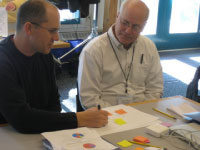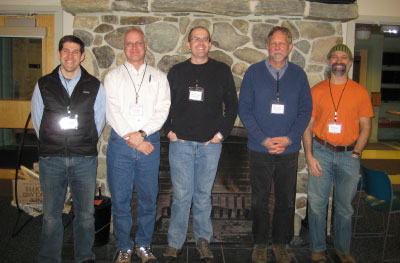Faculty/Graduate Student Collaborative Workshop at the DMC
Workshop Theme: Ocean-Climate Connections |
|
Held at the Darling Marine Center in Walpole, ME
Friday, January 29, 2010 and Monday through Tuesday, February 1-2, 2010 |
|
|
|
COSEE-OS researches, tests, and builds systems to improve how scientists can contribute meaningfully to the education enterprise. We have offered scientist-led
professional development workshops for educators designed to reach inland audiences with ocean content at the University of Maine, the University of New Hampshire,
and the University of Connecticut. Based on experience from these workshops and other COSEE-OS initiatives, we have crafted a new workshop model that includes
specific professional development for faculty and graduate students - including use of pedagogical techniques such as concept mapping and on-line collaboration
tools. These workshops are designed to promote productive interactions and increase communication between faculty and graduate students. COSEE-OS will offer
these "Faculty-Graduate Student Workshops" at various venues and train facilitators at other COSEE Centers to implement the workshops.
In this workshop, 5 ocean scientists from the University of Maine, Bigelow Laboratory for Ocean Sciences, and the Gulf of Maine Research Institute were trained
in concept mapping techniques. They were then immediately asked to create concept maps depicting their "research stories" for a target audience of "freshman in
college with no marine science background".
For most of these faculty, this was their first experience with concept mapping, but overall they responded positively to this pedagogical tool. In a short
reflection evaluation after day one of the workshop they were asked: "How did you have to modify your map to adjust to the target audience?" One responded, "Death
to jargon! Simplify!" Another faculty member described his day's experience: "It was fun. Concept mapping was a good exercise in how to organize and
communicate information." When asked if this process would be useful in their work, one replied, "Yes. I think that will be useful both for organizing
my own thoughts and for helping students in my lab to put their work into context."
The 5 faculty (now concept mapping gurus!) were then matched on day two of the workshop with 17 graduate students and postdoctoral researchers to improve
their collective understanding of Earth's major ocean - climate systems. The teams created consensus-based maps from the faculty members' original maps - capitalizing
on insights from graduate students' experiences with undergraduates to further tailor the consensus map for their target audience.
Click on their names in the menu at left to learn more.
|
|
From left: Benjamin Twining, Lawrence Mayer, Andrew Pershing,
Peter Jumars, and David Fields |
|







